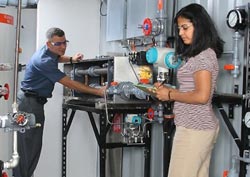Fighting Ecological Invaders Efficiently

<br>
By disinfecting the ballast water in ships, a system named Sicure protects marine environments from damage due to the introduction of alien plant and animal species.
In addition, Sicure can also process cooling water. This combination of features is unique worldwide. Siemens has now received full certification for Sicure from the International Maritime Organization (IMO). A new IMO guideline will require that all ocean-going ships be equipped with certified disinfecting equipment for sterilizing their ballast water. This regulation will mean that over 50,000 ships worldwide will have to be retrofitted in the near future.
Ships that aren't carrying a load are stabilized by taking on ballast water directly from the sea. However, when discharging that water again, ships can introduce organisms into foreign ecosystems. For example, it was ballast water that introduced the European zebra mussel into the Great Lakes of North America where they have caused extensive damage to water pipes and drainage systems. Another example of the phenomenon is provided by the mitten crab, a species from northern Asia, which was brought to North America and Europe where it has caused the extinction of a number of local species.
In order to limit natural and economic damage, the IMO now requires ships to be equipped with a certified ballast water processing system that conforms to specified standards. Actually, these systems aren't in use 95 percent of the time, because the process of taking on or releasing ballast water doesn't last very long.
In contrast, because of its ability to process both ballast water and cooling water, the new Sicure system can be in operation continuously, making a separate system for the cooling water unnecessary. The IMO has confirmed Sicure's positive environmental credentials as well as its compliance with safety standards. Sicure is a further development of the Chloropac system, which has successfully been processing seawater in cooling circulation systems for 35 years.
The process of electrolysis produces hypochlorite, a disinfectant, from the salt contained in seawater. The system is a combination of a filtering phase followed by an electrolysis phase, where the introduction of the hypochlorite is precisely regulated. Additionally, by injecting a small amount of hypochlorite solution into the water before it enters the ballast water filter, the Sicure system reduces the risk of fouling through biological contaminants.
This added step, which reduces system failures and maintenance, has been registered as a patent by Siemens.
Media Contact
More Information:
http://www.siemens.com/innovationnewsAll latest news from the category: Ecology, The Environment and Conservation
This complex theme deals primarily with interactions between organisms and the environmental factors that impact them, but to a greater extent between individual inanimate environmental factors.
innovations-report offers informative reports and articles on topics such as climate protection, landscape conservation, ecological systems, wildlife and nature parks and ecosystem efficiency and balance.
Newest articles

A universal framework for spatial biology
SpatialData is a freely accessible tool to unify and integrate data from different omics technologies accounting for spatial information, which can provide holistic insights into health and disease. Biological processes…

How complex biological processes arise
A $20 million grant from the U.S. National Science Foundation (NSF) will support the establishment and operation of the National Synthesis Center for Emergence in the Molecular and Cellular Sciences (NCEMS) at…

Airborne single-photon lidar system achieves high-resolution 3D imaging
Compact, low-power system opens doors for photon-efficient drone and satellite-based environmental monitoring and mapping. Researchers have developed a compact and lightweight single-photon airborne lidar system that can acquire high-resolution 3D…





















